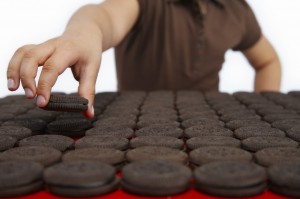
“As a child when I was sad, I was often cheered by a sweet treat by my parents. Now when I’m an adult I treat my emotions with a sweet treat.”Does this replicate you?
Most of us are unaware whether we are emotional eaters and a huge percentage of population is still unknown to “Emotional Eating”, in India.
What is Emotional Eating?
- Are you one among those who do not know the reason why you put the weight back on?
- Do you eat when you are bored or don’t know what to do?
- Do you often munch late nights?
- Do you overeat whenever you are feeling a strong emotion such as sadness or loneliness?
- Do you get hungry out of the blue and on odd times of the day?
If your answer to the above questions is yes, then you are an Emotional Eater.
Emotional eating is the practice of consuming large quantities of food usually in response to ‘feelings’ instead of ‘hunger’. These foods are none other than comfort foods and junk foods.
Emotional Eaters satisfy themselves by overeating and in the due process they gain weight. An ‘emotion’ triggers the physical symptom of hunger in an emotional eater. Depression, fatigue, abandonment, boredom, grief, loneliness, anger, insecurity, jealousy, anxiety, frustration, irritation, emptiness, resentment, stress, emotional baggage, problems with interpersonal relationships and poor self-esteem are few of common emotions emotional eaters show and this can result in overeating and unwanted weight gain.
What happens when you are emotionally hungry?
- Emotional Hunger is sudden, like after a good meal you are again hungry.
- Emotional Hunger has specificity, like you need a specific or a particular food to satisfy you. For e.g. a Cadburys Dairy Milk Chocolate.
- An Emotional Eater if when full continues eating to satisfy the emotional need (the person is unaware why he is eating so much).
- Emotional Hunger can be satisfied by having a glass of water.
- Emotional eating leaves behind the feeling of guilt, shame, self-pity, avoidance, dieting.
Comfort foods are foods a person eat to obtain or maintain a feeling, says Brian Wansink, PhD, director of the Food and Brand Lab at the University of Illinois. Comfort foods are often wrongly associated with negative moods, and indeed, people often consume them when they are down or depressed, but interestingly enough, comfort foods are also consumed to maintain good moods.
Emotional Eaters always tend to reach for the food that satisfies the particular emotion they are going through at that time. According to an article by Wansink, published in the July 2000 American Demographics, “The type of comfort foods a person is drawn toward varies depending on their mood.
According to experts estimate, 75% of overeating is caused by emotions. So dealing with emotions appropriately is important. By identifying what triggers our emotional eating, we can substitute more appropriate techniques to manage our emotional problems and take food and weight gain out of the equation.
-Aliakbar Shabbir
(Integrative Health Coach)
www.energysense.in
*References for the article can be obtained from the writer.















